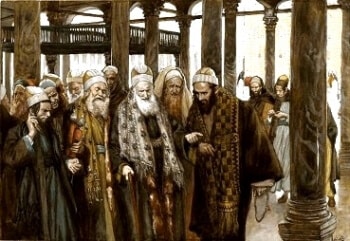
Addictions are taking good things to an extreme, to the point that they take over that place in us that belongs only to God. There are “substance” addictions—food, alcohol, drugs. There are “activity” addictions—entertainment, sports, work, shopping. Codependent relationships that cause one to center their lives around meeting the needs of another person—children, grandchildren, an addicted family member—can also be addictions. Then, of course, there is money, the addiction then tends to run our world. As children of Adam and Eve, we all have tendencies to put created things above our Creator.
Today Jesus talks about the subtle addiction that held a grip on some of the religious leaders (Matthew 23:1-12)
“The scribes and the Pharisees have taken their seat on the chair of Moses. Therefore, do and observe all things whatsoever they tell you, but do not follow their example. For they preach but they do not practice. They tie up heavy burdens hard to carry and lay them on people’s shoulders, but they will not lift a finger to be moved.”
Jesus distinguished between the professional and personal lives of these leaders. Sitting on the “chair of Moses” they were to be taken seriously. Even in that capacity, however, they overstepped their bounds by making extreme demands on the people. They put heavy burdens of excessive religious demands on them and would not make the slightest effort to ease them. On a personal level, they considered themselves above the law and didn’t practice what they preached.
Jesus knew that when his Church was established, its leaders would be tempted to do the same–preach but not practice.
He elaborated:
“All their works are performed to be seen. They widen their phylacteries and lengthen their tassels. They love places of honor at banquets, seats of honor at banquets, seats of honor in synagogues, greetings in the marketplaces, and the salutation “Rabbi.”
These men were addicted to prestige. They loved to attach religious “decorations” to their clothes because this impressed people. They drew satisfaction from walking proudly to seats of honor at banquets and synagogues, so to gain the admiration of those who watched them. And they liked being regarded as important by being called “Rabbi,” in the marketplaces. This sense of superiority in them fed their pride giving them an exaggerated belief about their own importance.
Beneath their religious demeanor, of course, was the addiction to greed. They loved money, even though poor people had to make great sacrifices to give it to them. They took advantage of their position and used it to better feather their own nests.
Pride and greed seem to be the foundation of their spiritual lives. They were not motivated by loving God, honoring Him, and being servants to his children.
Jesus concluded with:
“The greatest among you must be your servant. Whoever exalts himself will be humbled; but whoever humbles himself will be exalted.”
Religious leaders are needed. The greater they are, however, the more they are to take on the role of servants, and the more they must learn to humble themselves.
Lent challenges us to look at our own addictive tendencies. We ask the grace to put God first and use religious practices to support not replace our love for Him.
